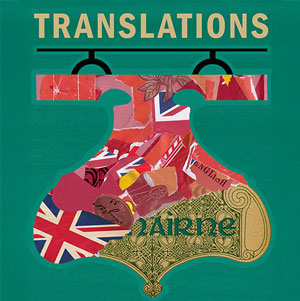
 *** First Floor Theater’s “In His Hands” is a heartfelt story about two men in a loving relationship and their coming to terms with Christian dogma having to do with homosexuality. Written by Benjamin Benne and directed by Micah Figueroa, the play reveals deep truths about their respective lives that create some tension between them. Despite the fact that things start out funny and fun-loving, there are many moments during the course of the show that are cringeworthy; this is possibly the reason for having a 16 and over age requirement to see this production.
*** First Floor Theater’s “In His Hands” is a heartfelt story about two men in a loving relationship and their coming to terms with Christian dogma having to do with homosexuality. Written by Benjamin Benne and directed by Micah Figueroa, the play reveals deep truths about their respective lives that create some tension between them. Despite the fact that things start out funny and fun-loving, there are many moments during the course of the show that are cringeworthy; this is possibly the reason for having a 16 and over age requirement to see this production.
Daniel (Yuchi Chiu) and Christian (Alex Benito Rodriguez) meet at a computer firm when Chris takes a job as a tech engineer. Daniel works at the front desk, while at the same time he is trying to become a minister in the Lutheran Church. He is immediately attracted to Chris and prays that they might get to know each other better. What Daniel likes most about his job is being of service: a principle that he learned from his father. In so doing, he enjoys learning about the various habits of all the employees, so that he can be of service to them. In keeping with this philosophy, he keeps a jar of many different kinds of candy on top of his desk in the belief that the office staff is more likely to get to know him better if he provides a sweet treat for everyone. In fact, Daniel makes it a point of learning the types of candy that each person enjoys. By keeping the conversation light and focused around candy, Daniel becomes better acquainted with Chris. Soon they discover that both of them enjoy a game called N64 (i.e., Nintendo 64). After going to Chris’s home and having fun playing Nintendo, their friendly relationship develops into a romance.
While Daniel speculates on why he did not get his plum appointment within the Lutheran Church, Chris is busy battling his own demons from the time he was raised in the Baptist Church. Chris constantly remembers how his father (Matt Klinger) and other coreligionists treated him with distain when his homosexuality (and possible effeminate nature) became evident. In addition to beating him in order to save his soul from eternal damnation, Chris’s father subsequently sent him away to a special ministry, where the conversion therapist (Matt Martin) did more damage to him than just offer to “pray the gay away.” We see a bit about how brutally Chris was once been treated by his father and also by the therapist: all in the name of love. We witness how Chris imagines killing his father and alternatively how he becomes a lost soul when he starts to internalize harsh religious dictates about homosexuality taken from the Bible. Not only does this jeopardize his sense of self-worth but his very existence.
Some of the lines in this show are very poignant, especially one taken from the Bible which is interpreted to mean that there is a major problem when men act too feminine and that this is considered even more appalling to some Christians than the idea of homosexuality itself. This part of the script led to a discussion afterwards with my guest: We agreed that over the centuries, the Bible has been used to justify almost anything and everything: such as slavery, polygamy, male superiority, and the subservience of feminine roles. As an aside, I wondered how Chris’s mother might have felt about their son being sent away to reside with the conversion therapist. However, she was not mentioned in this story. Had she been around, would her opinion have really mattered?
Jonathan Berg-Einhorn’s scenic design is good but relatively minimal. Some gray circles and gray brick blocks on the back wall are intriguing and very simple for such a small stage. The only prop is Anastar Alvarez’s giant gray trapezoid, a large three-dimensional object whose creative uses are infinite! Depending on how it is flipped around (and it takes two people to do it), the trapezoid serves as the front desk, a couch, a gradient for playing computer games, and so on. Although I would have liked to see a few more props on stage, the actors did a great job using pretend keyboards and pretend candy jars and allowing the audience do all the imagining. The lack of props also allowed the scenes to move quickly from one to the next. Costume design by Isaac Pineda is appropriate for the current era. Highest marks must go to the violence and intimacy co-directors Courtney Abbott and Kirsten Baity for their smoothness in handling scenes that entail close contact among the actors. Not unpredictably, the show starts out with the song, “He’s Got the Whole World in His Hands” so the audience knows from the onset that God and religion will play an important role. Peter Clare, the composer and sound designer, has done a fine job ensuring that this theme resonates throughout.
This is very much a story about the fondness of two men for each other and how it affects the way they view the world and look upon their own biographies. The play also generalizes about the trauma that many gay men may face when their sexual orientation is at odds with strictly-interpreted Christian doctrine. It also demonstrates what can happen when a person’s authentic self is ostensibly rejected by their families, their faith communities, or possibly even the wider society. Ultimately, it is kindness and compassion that helps Chris to overcome society’s negative messages, but the tale could have been made more powerful if it were handled with greater finesse. At present, it is somewhat too preachy and much too repetitive. We don’t need to see how often Chris rustles the candy on the desk or watch how the two men demonstrate how they “wrap their head” around various ideas. While they play their N64 game a few times too many, the choreography involved in the game scenes is dynamic and wonderful; this is, in fact, one of the most engaging parts of the show. Further, the presentation portrays somewhat more intimacy and frank talk about sex than perhaps is necessary to tell this story. Yet discovering the meaning of God in the lives of these two men is interesting, considering their respective experiences with the Lutheran and the Baptist denominations. Most importantly, we can see how both men have a strong moral sense independent of their previous religious training and their current religious affiliation (or lack thereof). It is ultimately with regard to matters of morality which becomes the most important factor in how these men choose to relate to each other.
“In His Hands” is playing through August 24, 2024, at The Den Theatre, 1331 N. Milwaukee Avenue, in Chicago’s Wicker Park neighborhood.
Tickets range to $35.00, plus a $1.00 facility fee and up to a $5.75 convenience fee (depending on the initial price)
Note that there are four pricing tiers. “All pricing tiers are general admission and are offered in the spirit of accessibility. Please purchase a ticket at whatever level is financially comfortable for you. In addition to the paid tiers, there are also a limited number of free tickets available. Use code FREE to unlock 1 complimentary ticket to the performance. Paid tickets, especially the full price $35 level, make this program possible. Thank you!”
 Performance schedule:
Performance schedule:
Thursdays, Fridays, and Saturdays – 8:00 p.m.
Sundays – 3:00 p.m.
Additional performance – Sunday, August 24 at 8:00 p.m.
Industry Nights –August 12, 15, 16, 17 – 8:00 p.m. and August 18 at 3:00 p.m.
For more information and to purchase tickets, please visit https://thedentheatre.com/performances/2024/7/25/in-his-hands-the-den-theatre or call the box office at 773-697-3830.
To see what others are saying, visit www.theatreinchicago.com, go to Review Round-Up and click at “In His Hands”.






More Stories
“Translations”
“The Firebugs” reviewed by Julia W. Rath
“The Book of Grace” Al Bresloff with another from Paul LIsnek